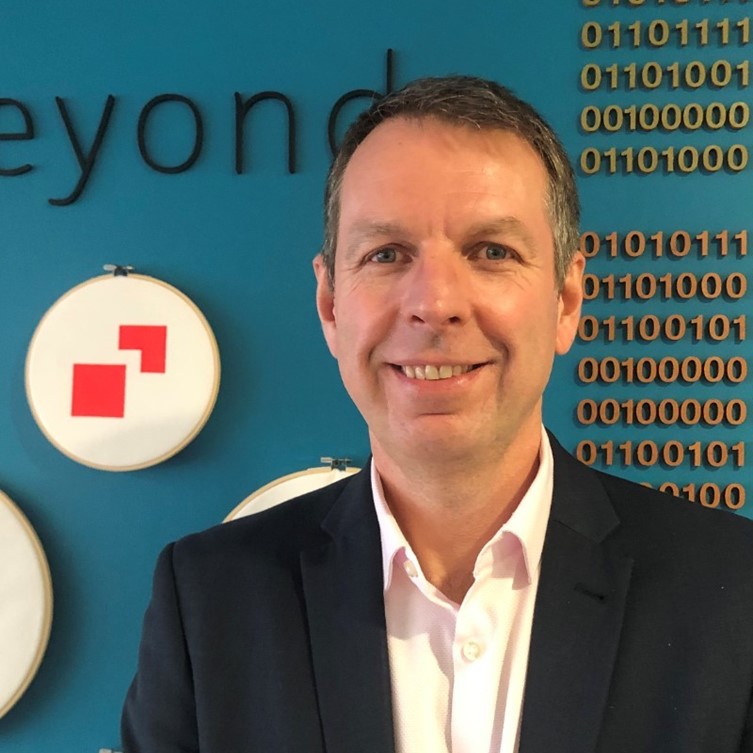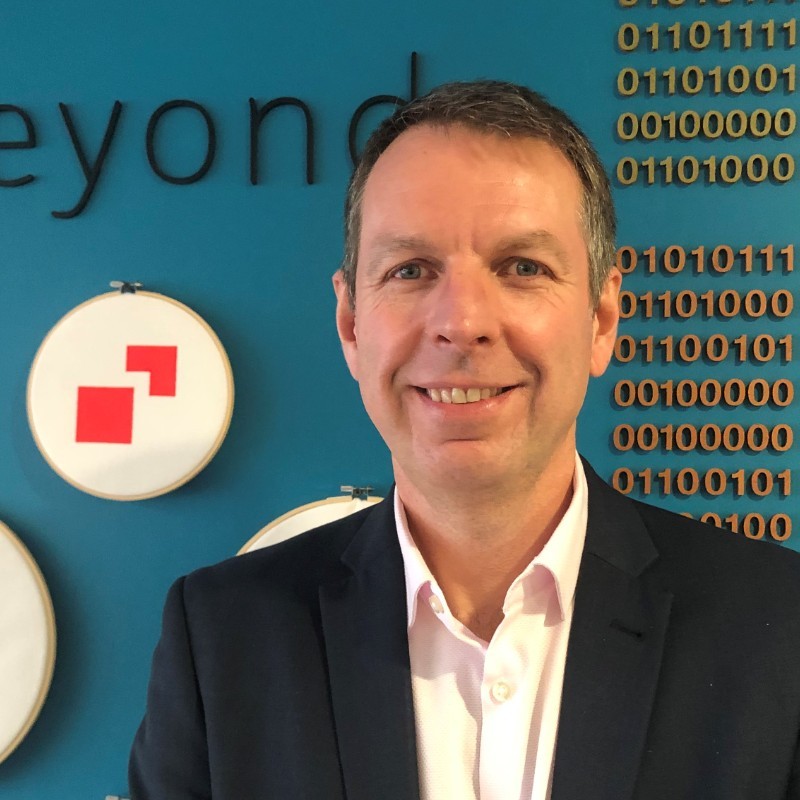Creating A Culture of Caring, With Nigel Dove.
Jacobs is a global company, with a turnover of c$14 billion in revenue, delivering impactful solutions to create a more connected, sustainable world — from intelligence to infrastructure, energy, cybersecurity to space exploration. They have more than 55,000 people across 400 offices and client sites, so culture and communication across the organisation is no small task. Racheal Emson, Vice Chair of Communications for the CIM's North West Board catches up with Nigel Dove, Marketing & Communications Director for Jacobs, to discuss the importance of creating a caring culture.
What’s your role at Jacobs?
"I look after marketing and communications for our Energy, Security & Technology business unit which has 8,000 people, covering mainly main nuclear and defence. In nuclear (which produces 20% of electricity and 40% of our low carbon electricity) we help design, build, maintain and decommission nuclear power stations. We are also at the forefront of new nuclear power technology including fusion and small modular reactors.
As part of the leadership team, I manage a small inhouse marketing and comms team and it starts with listening carefully to others - our employees, customers, and stakeholders. It’s about the fundamental truths, I believe it’s not what a business says but what does that ultimately matters.
Having joined Jacobs when Jacobs completed the acquisition of Wood Nuclear on 9th March 2020, a week before the pandemic hit the UK, I helped manage a complex integration virtually. We brought 2000 new employees into Jacobs and merged with an existing team of 2,500 long standing Jacobs colleagues to effectively create a new business unit. Managing integration throughout the pandemic certainly provided an additional layer of challenge.
Although many of our team remained on client sites or at our laboratories throughout the COVID-19 lockdown to provide support to mission critical projects, many of the team, just as most businesses, have worked remotely. At the time lockdown started we were running on two separate IT systems for the first few months.
Once we got people stabilised and working effectively at home (4500 people in 3 days), in many ways we were able to speed up integration, keeping people focussed running the business effectively."
How important is it for Marketing to be at a leadership level?
"Being a leader at Jacobs means living our cultural ethos which is caring for our clients as if it were our own business and caring for our staff as if they were family. Jacobs has a very distinctive and inspirational culture based around a truly inclusive and diverse approach and a very visible culture of caring. Leaders must lead from the front and show how they are encouraging and cultivating this unique culture. "
How do you go about creating a ‘culture of caring’?
"Well, it’s part of the everyday conversation in the business. At Jacobs we start internal or external meetings with a culture of caring moment.
Fundamentally to care you also need to listen. Often people do not listen with the intent to understand, they listen with intent to reply – it’s human nature (we are programmed to answer questions from school age).
Active listening allows you to build and demonstrate empathy with your counterpart, which is the fastest way to establish trust and credibility. It’s also essential to build an inclusive approach,
- Active Listening: Listen to their side and make them aware you’re listening.
- Empathy: You get an understanding of where they’re coming from and how they feel.
- Rapport: Empathy is what you feel. Rapport is when they feel it back. They start to trust you.
- Influence: Now that they trust you, you’ve earned the right to work on problem-solving with them and recommend a course of action.
- Behavioural Change: Change happens because people understand the reason for it and ultimately trust you
This model was developed by Chris Voss, a former lead international hostage negotiator for the FBI. When negotiating these high stakes situations, the FBI often employs as many as 5 additional people to simply listen to the conversation."
How did the Jacobs organisation respond to the pandemic and support staff?
"Very quickly we appreciated the mental health impact of lockdown on our staff, their families and friends. Whilst we already had an advanced approach around mental health, we accelerated a new well-being and resiliency programme which provided a range of practical solutions to help staff and their family to understand and cope with how they were feeling.
We also encouraged and promoted the positives, including the huge effort by staff who, either through their day jobs or volunteering, did amazing things to help others manage through the crises.
We really focussed on doing everything we could to help care for our staff and clients, it was inspiring and humbling to be a part of this and led from the top. Despite being part of a large global company, communications during the pandemic have been outstanding. The Chief Executive led a global weekly Town Hall which regularly had 20,000 people joining.
As an example in autumn 2020, following the death of George Floyd, the company galvanised its black employees and allies through a series of courage conversations (incredibly vivid and powerful calls where staff shared their own experiences) and from this launched its own Action Plan for Social Justice. This showed how Jacobs would amplify its culture of belonging, recruit, retain and advance Black employees based on merit and contribute to structural change in the broader society."
What is the secret to innovation and endurance?
"Put simply values make things happen.
Our Values are 1) We do the right things, 2)We aim higher, 3) We challenge the accepted and 4) We live inclusion.
Our brand promise is “challenging today and reinventing tomorrow” and we do this by solving the world's most critical problems for thriving cities, resilient environments, mission-critical outcomes, operational advancement, scientific discovery and cutting-edge manufacturing, turning abstract ideas into realities that transform the world for good. This aspirational purpose connects all of our teams to solving the world’s most important challenges, transforming our world for the good of everyone.
It's this clear sense of purpose that helps us attract and unleash the best engineering and technical talent to solve problems from supporting the NASA's new deep space human exploration program, to creating new energy sources like Fusion. "
How have you marketed your innovation to build awareness and create demand?
"Jacobs is a big company undergoing rapid change. Three years ago, it sold its oil and gas business (previously a core part of the business) and then bought CH2M Hill, one of the world's leading programme management companies. More acquisitions followed increasing its cyber and intelligence capabilities. So, the Jacobs of 4 years ago is radically different to the current business. One of our key challenges is to communicate this ever changing business and what we can do for clients."
Finally, what does being based in the NW mean for creativity & innovation?
"With my previous roles in the Northwest I understand the region's heritage. To me the Northwest is not only about having the freedom to come up with great ideas but the determination to bring these ideas to fruition and get things done. Whilst at the Regional Development Agency, working on projects like the Commonwealth Games, the BBC relocation to Manchester and Liverpool's Capital of Culture taught me that anything is possible in the region. From our 12,000m² Birchwood laboratories near Warrington we are helping to create fusion technology which recreates the power of the sun on earth. Operating at 15 million degrees Celsius it has the potential to create limitless carbon-free energy in the future."
CPD Webinar: Turn up the Volume: Amplify Culture and Make a Difference
We would like to thank both Rachel and Nigel for their contribution to this Spotlight feature. If you liked what Rachel and Nigel have discussed, why not watch Nigel's CIM webinar for free. In this webinar Nigel covers the challenges of integrating new organisational acquisitions in a virtual world, Jacob’s workplace values and culture, as well as how the culture is being amplified, the importance of inclusion and diversity, and the teams introduced a new corporate brand positioning to signal the move to solutions and empower employees to tell their story.



